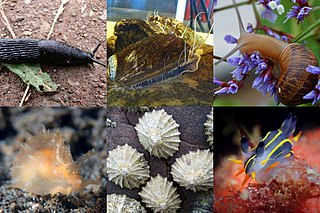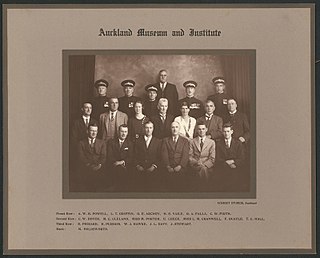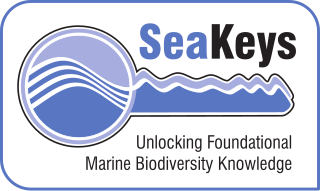
Marine biology is the scientific study of the biology of marine life, organisms in the sea. Given that in biology many phyla, families and genera have some species that live in the sea and others that live on land, marine biology classifies species based on the environment rather than on taxonomy.
Genus is a taxonomic rank used in the biological classification of living and fossil organisms as well as viruses. In the hierarchy of biological classification, genus comes above species and below family. In binomial nomenclature, the genus name forms the first part of the binomial species name for each species within the genus.

The Great Barrier Reef is the world's largest coral reef system, composed of over 2,900 individual reefs and 900 islands stretching for over 2,300 kilometres (1,400 mi) over an area of approximately 344,400 square kilometres (133,000 sq mi). The reef is located in the Coral Sea, off the coast of Queensland, Australia, separated from the coast by a channel 100 miles wide in places and over 200 feet deep. The Great Barrier Reef can be seen from outer space and is the world's biggest single structure made by living organisms. This reef structure is composed of and built by billions of tiny organisms, known as coral polyps. It supports a wide diversity of life and was selected as a World Heritage Site in 1981. CNN labelled it one of the Seven Natural Wonders of the World in 1997. Australian World Heritage places included it in its list in 2007. The Queensland National Trust named it a state icon of Queensland in 2006.

The gastropods, commonly known as slugs and snails, belong to a large taxonomic class of invertebrates within the phylum Mollusca called Gastropoda.

Hermit crabs are anomuran decapod crustaceans of the superfamily Paguroidea that have adapted to occupy empty scavenged mollusc shells to protect their fragile exoskeletons. There are over 800 species of hermit crab, most of which possess an asymmetric abdomen concealed by a snug-fitting shell. Hermit crabs' soft (non-calcified) abdominal exoskeleton means they must occupy shelter produced by other organisms or risk being defenseless.

Sea slug is a common name for some marine invertebrates with varying levels of resemblance to terrestrial slugs. Most creatures known as sea slugs are gastropods, i.e. they are sea snails that over evolutionary time have either completely lost their shells, or have seemingly lost their shells due to having a greatly reduced or internal shell. The name "sea slug" is most often applied to nudibranchs, as well as to a paraphyletic set of other marine gastropods without obvious shells.

Isopoda is an order of crustaceans that includes woodlice and their relatives. Isopods live in the sea, in fresh water, or on land. All have rigid, segmented exoskeletons, two pairs of antennae, seven pairs of jointed limbs on the thorax, and five pairs of branching appendages on the abdomen that are used in respiration. Females brood their young in a pouch under their thorax.
Richard Kenneth Dell was a New Zealand malacologist.

AlgaeBase is a global species database of information on all groups of algae, both marine and freshwater, as well as sea-grass.

Arthur William Baden Powell was a New Zealand malacologist, naturalist and palaeontologist, a major influence in the study and classification of New Zealand molluscs through much of the 20th century. He was known to his friends and family by his third name, "Baden".

Turritellidae, with the common name "tower shells" or "tower snails", is a taxonomic family of small- to medium-sized sea snails, marine gastropod molluscs in the Sorbeoconcha clade.
Zeacolpus is a genus of medium-sized sea snails, marine gastropod molluscs in the family Turritellidae, known as the turritellas or tower shells.
Zeacolpus vittatus is a species of large sea snail, a marine gastropod mollusc in the family Turritellidae, the tower snails.
The World Register of Marine Species (WoRMS) is a taxonomic database that aims to provide an authoritative and comprehensive list of names of marine organisms.

Freshwater snails are gastropod mollusks that live in fresh water. There are many different families. They are found throughout the world in various habitats, ranging from ephemeral pools to the largest lakes, and from small seeps and springs to major rivers. The great majority of freshwater gastropods have a shell, with very few exceptions. Some groups of snails that live in freshwater respire using gills, whereas other groups need to reach the surface to breathe air. In addition, some are amphibious and have both gills and a lung. Most feed on algae, but many are detritivores and some are filter feeders.
Zeacolpus fulminatus is a species of sea snail, a marine gastropod mollusk in the family Turritellidae.

Stiracolpus pagoda, common name the pagoda turret, is a species of sea snail, a marine gastropod mollusk in the family Turritellidae.

Shrimp are crustaceans with elongated bodies and a primarily swimming mode of locomotion – most commonly Caridea and Dendrobranchiata of the decapod order, although some crustaceans outside of this order are referred to as "shrimp".

SeaKeys is a large collaborative marine biodiversity project funded through the Foundational Biodiversity Information Program in South Africa. The purpose of the project is to collect and distribute genetic, species and ecosystem information relating to marine biodiversity in southern Africa, which may be used to support informed decision-making about the marine environment.

Heteropsammia is a genus of apozooxanthellate corals that belong to the family Dendrophylliidae.













